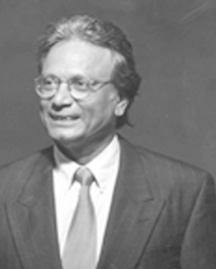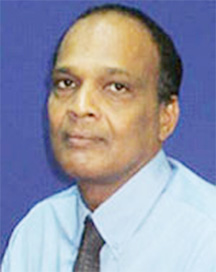Shadow Minister of Agriculture Dr Rupert Roopnaraine says it is amazing that GuySuCo has not done a nutrient analysis of its sugar fields given all of the concerns expressed about recent yields and he believes recent remarks by the Head of State signal that government has no comprehensive plan for sugar.
“For the first time at this level we see an acknowledgement that GuySuCo is in crisis,” Roopnaraine told Stabroek News in relation to the President’s remarks at the Enmore Martyrs memorial last Sunday. President Donald Ramotar had stated that the sugar industry was in crisis and even sought the public’s input on how to resuscitate the sector, floating cooperatives as a potential methodology.
Roopnaraine stated that the President’s message was a clear indication thatno comprehensive plan has been put in place. He said that time and time again, the government and the management at the Guyana Sugar Corporation have promised fixes and they have all fizzled. He noted that GuySuCo recorded its lowest first crop in history under the current Board of Directors yet the government remains unmoved by the calls for a shakeup, inclusive of more agriculture experts.

Roopnaraine told Stabroek News that “the fields are a mess…I don’t believe that it is an either or situation; it is both the fields and the management that hinder the sugar industry.”He said that “there has been a clear overconcentration on the factories—Skeldon, Enmore, LBI—and the problem of the fields are left to worsen.”
Roopnaraine said that “the problem with the field is not a two-month, two-year solution; we have to begin with a clear understanding and analysis. The fact is that we have had turnaround after turnaround, all of which has come to naught.” He further said that with all the attention being brought to the state of the fields and the lack of regeneration, it was still amazing that GuySuCo has refrained from doing a full and complete analysis of the field, inclusive of the nutrient levels.
He stated that President Ramotar was previously on GuySuCo’s board and should have a better understanding of the state of the industry, so his acknowledgment of the dire situation was a long time in the making. The President’s remarks, he noted, were very telling of how unserious GuySuCo has been in the past. “This is agriculture; at the end of it they are running a large agricultural enterprise and we don’t know the state of the fields and we don’t have agriculturists on the board,” he added. “You would think that if you are forming a recovery plan part of that would mean field evaluation because right now they aren’t getting the sucrose yield from the cane.”
The President’s appeal for input from the public on GuySuCo’s turnaround was met with scepticism by Roopnaraine, who noted that it made little sense since there were already experts in the country who have given their recommendations. “Instead of experts, they put people on the board and the people they put on the board follow the line of party loyalty [rather] than competency necessary for the industry,” he argued.
He added that accountants and financial consultants are welcomed to be a part of the board, but GuySuCo’s lone agriculturist Dr Dindyal Permaul was not “nearly sufficient or enough” for a company as large as GuySuCo nor an industry that Guyana has been dependent on for over half a century.

Roopnaraine also stated that warnings by union leader Komal Chand that the damage to the fields may not be reversible was very concerning and the government and GuySuCo now had to operate on the grounds that it can be fixed, but drastic measures are needed.
‘It is not like we don’t try’
Meanwhile, GuySuCo’s Chief Executive Officer Paul Bhim stated that the state-owned sugar corporation has continuously been under pressure to grow cane and produce sugar. He said that the board” has always had agriculturists, Dr Permaul is an eminent agricultural scientist and before him we had JB Raghurai a very experienced agriculturist”. Bhim said that the board had experts and experts were sought out when needed.
He noted that many of the recommendations from other industry experts such as Anthony Vieira and Beni Sankar are kept at the board level of GuySuCo. Bhim acknowledged that the sugar corporation had to get its tillage up and replanting had to become a larger part of the industry’s mandate. He said, “it is not like we don’t’ try, you know… given the financial position that GuySuCo has been in we had other considerations.”
Bhim told Stabroek News that “the weather is one of the largest problems, we can’t apply fertilizer and then the rain comes, it makes no sense.” He continued that after fuel, fertilizer was the largest expense for GuySuCo, however the company’s financial woes have prevented fertilizer from being purchased in a timely manner and as a result it doesn’t get used in a timely manner.
When Stabroek News inquired about the President’s suggestion of utilising cooperatives, Bhim refrained from comment. President Ramotar stated last Sunday that “if the workers and the unions feel that they know and they understand the industry very, very good and they can produce better than the management I am ready to even consider giving them the land.”
Bhim stated that the President had the final say on matters concerning GuySuCo and he could make no other comment. He also refused to comment on the proposed restructuring of GuySuCo’s board. With GuySuCo’s financial situation well documented, Bhim also made no comment in relation to the expected Executive Chairman’s proposed $2.5 million monthly salary.
Bhim once again stated that the financial situation at GuySuCo placed pressure on sugar production so the field conditions were left unattended. “I believe what Chand was referring to was flood fallowing and that means taking land away for a whole year…we can’t have a field unused for an entire year when we have quotas to meet,” Bhim stated. He said that the flood fallowing was necessary, but with GuySuCo’s trouble with reaching targets and having the targets reworked on a seasonal basis, the corporation could not risk utilising all available land to grow cane.
Chand had presented a dire prognosis for GuySuCo if the land was left to further deteriorate. He said that the continuous deterioration of the land was reflective in production levels; the amount of cane needed just couldn’t be grown and the sucrose yields from cane has fallen significantly in the last 25 years. He warned that the damage being done if left for an additional six months could be irreversible, placing the sugar sector in more peril. In a letter to Stabroek News last week, Vieira stated that instead of continuously talking about the damage, starting to fix the problem would give results. “Any sugar industry can be returned to normalcy (as far as the canes are concerned) in four years…the sugar industry replants 20 percent of its fields every year, so in five years all the damage Mr Bhim and Mr Chand are seeing in the cane fields of GuySuCo today can be undone…” Vieira wrote.
Vieira stated that “the real problem” with GuySuCo is “that the management unassisted by a board of directors, which is totally at sea without a paddle or a compass, doesn’t know where to start to identify these problems and what they have to do to rectify them.” He further stated that while the president asked for advice and he has provided advice for years, the decisions ultimately fall to those in charge—the board and the management of GuySuCo. He noted that the labour shortage was indeed a problem. “No matter how good the canes, if you don’t reap them on time and conduct good husbandry practices on time there will be no cane in the fields,” he said.





